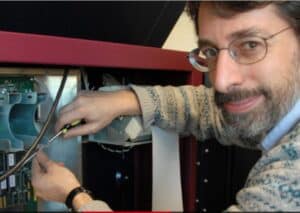Evidence provided by USPS whistleblowers was presented at a press conference by the Amistad Project alleging that anywhere from 130,000 to 280,000 completed ballots were shipped from Beth Page, NY, to Lancaster PA. The ballots and trailer then disappeared.
BREAKING:
Corroborated, eyewitness testimony alleges that up to 280,000 completed ballots were shipped from New York to Lancaster, Pennsylvania
…The ballots AND the trailer then disappeared
Has the @TheJusticeDept seen this?
RT!
— Charlie Kirk (@charliekirk11) December 1, 2020
Jesse Morgan, the truck driver, spoke in detail at the press conference about what transpired on the day he delivered the ballots. According to Morgan, what happened that day was far from normal. He made a pickup in Beth Page, NY, then had to take that delivery to Harrisburg, PA. When he arrived in Harrisburg he was made to wait for six hours before he was told what to do next.
Morgan said his normal routine was quick. He would get a dock, unload, get a ticket for confirmation that he was there and then be on his way. Growing frustrated with waiting, he tried to get the attention of postal workers but no one would tell him what was going on.
Finally he went inside and he was told to wait for the USPS Transportation Supervisor. He said this never happens and he thought it was strange. Morgan wanted a ticket and late slip so that he would be paid for his time waiting, but he received neither. The supervisor told him to take the trailer to Lancaster, which raised red flags to Morgan since he still had deliveries for Harrisburg on the truck.
After waiting from 9:15am to 3pm Morgan had enough and left without receiving a ticket or late slip. When he arrived in Lancaster, he unloaded his trailer in its normal place and parked his truck where he always has in a nearby lot.
When Morgan arrived to pick up his truck and trailer, the trailer was gone. “10R1440, since I started driving that Beth Page route, I’ve always have trailer 10R1440” Morgan stated.
Morgan wanted to speak up due to the series of strange events that happened that day. One of the things that really bothered him was the fact that he was driving completed ballots from New York to Pennsylvania.
Jesse Morgan—a truck driver (subcontractor) with USPS in PENNSYLVANIA…pic.twitter.com/EFxXZnQCUS
— Donald J. Trump (@realDonaldTrump) December 1, 2020
Another whistleblower working in Wisconsin alleges that a USPS employee named Rachel admitted to him “USPS employees were ordered to back date ballots that were received too late to be lawfully counted.”
“I did not bring any of this to my supervisors at USPS at the time, due to what I perceived to be their hostility towards President Donald Trump and their evident contempt for the law. I heard those same two post office employees making jokes about taking mail-in ballots for Trump and throwing them away. I’m not a Trump supporter, I’m not a Biden supporter either. In fact I didn’t vote for either of the main candidates, but something profoundly wrong occurred in Wisconsin during the presidential election and the American people have a right to know about it.”
— Donald J. Trump (@realDonaldTrump) December 1, 2020
Can You Hack an Election in 7 Minutes?
Can an election be hacked in seven minutes?
Andrew Appel, a professor at Princeton University set out to do just that, hack into a voting machine. In order to do this he could have tried traditional ways of hacking or writing malware to sneak on to a machine at a polling place that are left unguarded for days, but he decided it was much easier to just buy one online.
For the cost of a whole $82, Appel became the proud owner of a behemoth machine called Sequoia AVC Advantage. This machine is one of the oldest and most vulnerable in the US and is unfortunately used in places like Louisiana, New Jersey, Virginia and Pennsylvania.
No sooner did a team of bewildered deliverymen roll the 250-pound device into a conference room near Appel’s cramped, third-floor office than the professor set to work. He summoned a graduate student named Alex Halderman, who could pick the machine’s lock in seven seconds.
Clutching a screwdriver, he deftly wedged out the four ROM chips—they weren’t soldered into the circuit board, as sense might dictate—making it simple to replace them with one of his own: A version of modified firmware that could throw off the machine’s results, subtly altering the tally of votes, never to betray a hint to the voter. The attack was concluded in minutes.
To mark the achievement, his student snapped a photo of Appel—oblong features, messy black locks and a salt-and-pepper beard—grinning for the camera, fists still on the circuit board, as if to look directly into the eyes of the American taxpayer: Don’t look at me—you’re the one who paid for this thing.

Appel’s mischief might be called an occupational asset: He is part of a diligent corps of so-called cyber-academics—professors who have spent the past decade serving their country by relentlessly hacking it.
Electronic voting machines—particularly a design called Direct Recording Electronic, or DRE’s—took off in 2002, in the wake of Bush v. Gore. For the ensuing 15 years, Appel and his colleagues have deployed every manner of stunt to convince the public that the system is pervasively unsecure and vulnerable.
Beginning in the late ’90s, Appel and his colleague, Ed Felten, a pioneer in computer engineering now serving in the White House Office of Science and Technology Policy, marsha led their Princeton students together at the Center for Information Technology Policy (where Felten is still director).
There, they relentlessly hacked one voting machine after another, transforming the center into a kind of Hall of Fame for tech mediocrity: reprogramming one popular machine to play Pac-Man; infecting popular models with self-duplicating malware; discovering keys to voting machine locks that could be ordered on eBay.
Eventually, the work of the professors and Ph.D. students grew into a singular conviction: It was only a matter of time, they feared, before a national election—an irresistible target—would invite an attempt at a coordinated cyberattack.
There is no singular national body that regulates the security or even execution of what happens on Election Day, and there never has been. It’s a process regulated state by state.
The Princeton group has a simple message: That the machines that Americans use at the polls are less secure than the iPhones they use to navigate their way there. They’ve seen the skeletons of code inside electronic voting’s digital closet, and they’ve mastered the equipment’s vulnerabilities perhaps better than anyone (a contention the voting machine companies contest, of course).
They insist the elections could be vulnerable at myriad strike points, among them the software that aggregates the precinct vote totals, and the voter registration rolls that are increasingly digitized. But the threat, the cyber experts say, starts with the machines that tally the votes and crucially keep a record of them—or, in some cases, don’t.
Cleary hacking into voting machines is an easy task, which is a major concern for our democracy. If powerful people with money and resources want to stay in control, we now know they can make that happen very easily.
A WHOPPING 56% of Americans Say They are Better off Today (Mid-Pandemic) than Under Obama-Biden
A recent Gallup survey found that a whopping 56 percent of Americans say they are better off now under President Trump–in the middle of a pandemic–than they were four years ago when President Obama was in office.
Gallup writes:
During his presidential campaign in 1980, Ronald Reagan asked Americans, “Are you better off today than you were four years ago?” Since then, this question has served as a key standard that sitting presidents running for reelection have been held to.
Gallup’s most recent survey found a clear majority of registered voters (56%) saying they are better off now than they were four years ago, while 32% said they are worse off.
The Gallup Poll has just come out with the incredible finding that 56% of you say that you are better off today, during a pandemic, than you were four years ago (OBiden). Highest number on record! Pretty amazing!
— Donald J. Trump (@realDonaldTrump) October 9, 2020
Gallup compared the 56 percent number to 2012, during the Obama-Biden Administration when just 45 percent of Americans could say they felt they were better off. In 2004, 47 percent of Americans said they were better off and in 1992, that number was at 38 percent.
President Trump responded to the news, writing on Twitter, “The Gallup Poll has just come out with the incredible finding that 56% of you say that you are better off today, during a pandemic, than you were four years ago (Biden). The highest number on record! Pretty amazing!”










